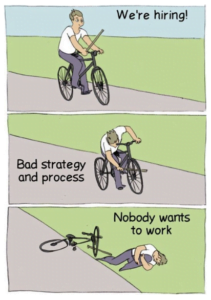As the owner of a recruiting agency for over 30 years, I can easily tell when a company is sabotaging their recruiting process. However, this ability didn’t come without lots of career experience.
Early in my career, I was in the high-potential employee development program. The company I worked with was driving insane growth with an average employee age of 22 years old. I remember one year they had hired 2,000 entry level college grads, more than any other company in the US at that time. Suffice it to say, sage leadership was sorely lacking.
I remember attending a leadership training with one of the company’s two industrial and organizational psychologists. One of them had written a book and I’ve always remembered the title, “Leadership is Always Simple, But Never Easy.” Understanding the difference between simple and easy was eye opening. Having said that, the term ‘leadership’ in the referenced book could easily be replaced with the word “recruiting.”
For many of the early years in my career, I would have struggled to tell you what really makes one recruiting firm or department better than the next. The truth was, you could have all the makings and ingredients but still be struggling to get results.
I wanted to make myself believe that the good firms were doing something different than the others. It was this difference that made one better than the next.
You can cover a lot of sins with effort and energy, but I learned that results, without the need to sacrifice your quality of life on the recruitment “altar of success,” was the result of well designed processes supported by leading edge technology. I’d love to argue that recruiting is complex and complicated, but the truth is recruiting isn’t rocket science. In fact, recruiting is simple, but not always easy.
Recruiters are often so hamstrung by processes (or lack of processes) that they don’t have the power, political capital, or latitude to improve. So, this is what you get. In reality, you are sabotaging your recruiting process and the end result is often unsatisfactory.
Below are the four most common ways employers sabotage the recruiting process.
Poor Communication
Okay, so this is an easy one. Poor communication is probably the most common way employers sabotage the recruiting process. But is it a simple fix? Not particularly.
The common causes for poor communication can often be systemic. This means that the core values are mere platitudes. There is gross failure to tie EVERY part of the recruiting process to the vision, mission, and values of the organization.
That said, assume that everyone is ‘trying’ to communicate, and they are demonstrating alignment with the core values. If your hiring manager can’t articulate the difference between what a good candidate looks like and what a bad candidate looks like to the person who is running the search then your success will likely look like a game of pin the tail on the donkey.
On the flip side, if your recruiter doesn’t possess the interrogatory skills then they will fail to gain the insights necessary to frame up a decent search or even analyze a resume for possible fit. It’s not that poor communication is hard to identify, but that effective communication is not easy.
Lack of Accountability
Lack of accountability can sabotage any process, not just recruiting. You can’t improve what you don’t measure. Sadly, HR executives often don’t know what metrics (KPIs) to track related to their recruiting efforts.
If you don’t have KPIs and service level agreements (SLAs), or you have them but they are the wrong ones, then your recruiting process will suffer. You’ll likely fail to get the level of engagement from either your recruiter or your hiring manager.
HR “IS” Recruiting
Relying on Retail Recruiting




